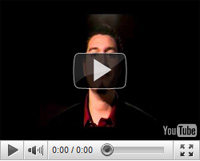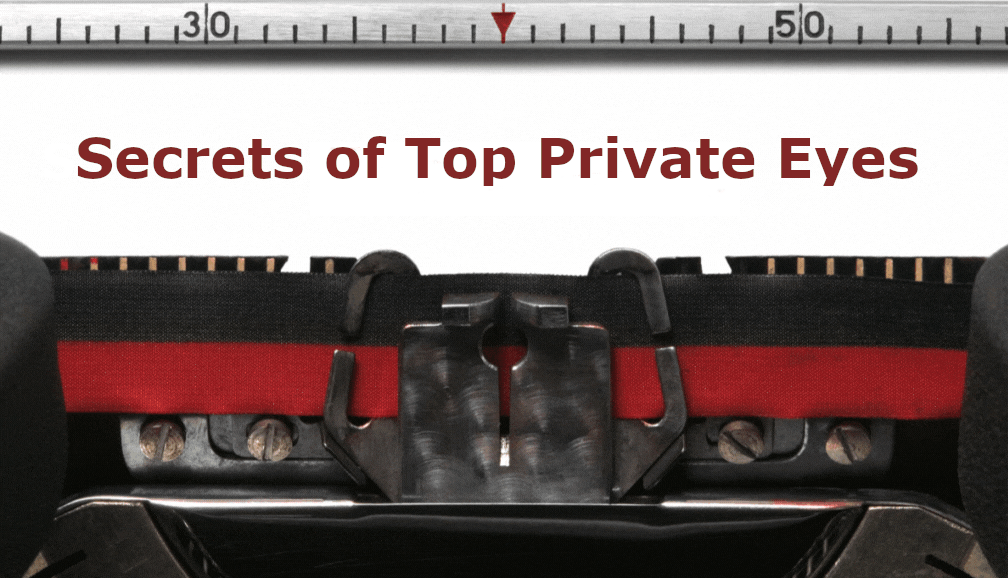COMPLETE ON-LINE TRAINING COURSE FOR
PROFESSIONAL INVESTIGATORS
Price $139

|
Questions & Answers
Private Investigator Career Advice
From the Experts
Private Investigators Career
Q.. Would I make a
good private investigator?
Basically the field of private investigation is so vast and diverse, from the
very high tech like computer fraud, to highly oriented people skills, like
interviewing witnesses, that there is a need for virtually all types of skills
and people. Probably the most necessary attribute is the deepest desire to get
at the truth. An almost dog like tenacity, hence, the symbol of the hound dog
with the magnifying glass used so often in private investigation. So, if you
like to follow every thread, dig out every clue and solve puzzles then you would
be a good investigator. The one other thing that was common among all of our
investigators was the deep desire to help people and fulfill their clients
needs. These two things together made for not only a good investigate but a
highly successful investigator.
Q. What does the job of a professional investigators involve?
Professional Investigators employ techniques such as public record searches for
background checks and pre-employment screening. Investigators interview people
to gain information, gather evidence and verify facts about individuals, events
or companies. They may provide assistance in civil liability and personal injury
cases, insurance claims and fraud, child custody cases, premarital screening and
martial infidelity. Some Private Investigative firms offer executive and
celebrity protection and some serve court papers.

Background & Training
Many people are of the opinion that most PI's are
former police officers or government law enforcement agents. The fact is, the
majority of Professional Investigators have little or no training or experience
in those fields. Almost anyone, man or woman, no matter his or her age,
background or experience (with the exception of convicted felons, of course),
can become a Professional Investigator.
Q. What training will I need to become a private investigator?
While there are no academic requirements for this field, a two-year
associate’s program or a four-year bachelor's program in a criminal
justice-related area is helpful to an aspiring Private Investigator. Most
Private Investigation firms offer a variety of services requiring their
Investigators to have a broad base of knowledge in several areas.
Many Private Investigator schools offer classes in specialized subjects
such as insurance and criminal investigations. These subjects are also offered
by community collages. Seminars designed to enhance investigative skills and
specialties are conducted by state and national private investigative
associations. Enlightened Investigators expand their knowledge base with
courses and seminars throughout their career.
The best training is on-the-job-training under an experienced investigator. The
trick is convincing the Private Investigative firm that you know enough to make
it worth their while to hire you. Get started with a good well-rounded course
that addresses the most common types of investigations, such as
"Secrets of Top Private Eyes." More information available from the
Department of Labor
Q Are internships required for Private Investigators?
Many states require Professional Investigators to serve an apprenticeship or
internship with an established, licensed PI or with an investigative
firm. Several Professional Investigator schools exist that offer entry-level
schooling and training that may or may not enhance on-the-job training and the
time-given acquisition of basic skills.
Q. What should I do to get started on a career as a
Private Investigator?
 |
"Someone who wants to get started in
this field, yes, go for it! It's not a shadowing profession. It's not Sam
Spade, it's a good, energetic, interesting and productive way of contributing
and making a living. You're doing the first thing you should do, right now -
which is research." - Linnea Sinclair, Private Investigator and Instructor
|
|
Q. Is a police background essential?
 |
"A lot of people think you need to have some kind of law enforcement background
to be a Private Investigator. Not true at all. Our business is comprised
of people who are streetwise and able to go out and get the information. You've
got to be a go-getter. Nothing to do with police work, or police techniques.
Being a PI is gaining information and knowledge. We go to a lot of seminars and
read a lot of articles. |
|
But, when it comes to 'formal' schooling, there's no formal. I think even
if you went to the John Jay School of Criminal Justice they could not get you
ready for doing investigations." - Peter Crummy, Private Investigator and
Instructor |
Q. What if I have no special training?
 |
"Having a background as a truck driver can be very sensible experience for the
investigative business. Say you're doing an undercover job for a trucking firm.
The man's been a trucker: that could be very essential. A man comes to me
and he says, 'I've worked 20 different jobs in my life.' I ask him to tell
me about each and every job he's ever worked - what he did for a living. That
man is going to be vital to me if I need to put him on the job. I might need
someone to pose as a real estate agent. We employ pretexts all day long in the
investigative business." - Bob Brown Private Investigator and Instructor
|
Women Investigators
Q. What is the history of women in the investigative
field?
 |
"In the early 70's there were very few female private
investigators. I know of only one. I did not hire women then because I just did
not think they would make good investigators. It was 1976 before I hired the
first woman investigator, a woman who really proved herself and proved to me
that women make excellent investigators. |
|
She did a superb job for me and was with me several
years." Since that time, I've hired many women. In each instance, they have been
superior to male investigators. They can acquire data that men cannot get. They
are less threatening. more and more women have come into Private investigation
business, not only as investigators, but as owners of agencies." - Nick and Pat
Beltrante, PI's, Instructors, Beltrante & Associates Private Investigations |
Q. Are there many opportunities for women investigators?
Since the early 1970s more and more women have come into Professional
Investigation business, not only as Private Investigators, but as owners of
agencies. Women Investigators are now in big demand because they are less
threatening. They can acquire data that men cannot get. Women are naturally
inquisitive by nature and generally more compassionate. Women look at a case -
especially if it involves child custody or marital situations - from a different
angle then a man. A woman is also a natural for undercover work.
Q Do
women make good investigators?
 |
"Women can do a lot more. We're not intimidating to people. I
would open my door to a women as opposed to a man. People will spill their guts
to a women when they won't give a man the time of day. We're sweet and nice and
we're not out to hurt anyone. - Pat Beltrante PI - Beltrante & Associates |
Q. Are there advantages for women investigators?
 |
"Women are naturally inquisitive. By nature we're more detail
oriented. Woman are generally more compassionate. Women look at a case -
especially if it involves child custody or marital situations - from a different
angle then a man. A woman is also a natural for undercover work. People tell me
all the time - and I take it as a compliment - 'You don't look like a Private
Investigator.' I like that." - Liz Crummey, Private Investigator - Crummey
Investigations, Inc. |
How much income can a Professional Investigator make?
Private Investigators enjoy well-paying and worthwhile careers. Experienced
Private Investigators can earn up to $100,000 a year while deriving
satisfaction from helping people and working on cases. Earn up to $52,000 per
year! Self-employed Private Investigators charge rates between $50 and
$150 per hour!
The
Department of Labor states the median annual wages of salaried private
detectives and Investigators were $41,760 in May 2008. The middle 50
percent earned between $30,870 and $59,060. The lowest 10 percent earned less
than $23,500, and the highest 10 percent earned more than $76,640. Wages of
private detectives and Investigators vary greatly by employer, specialty,
and geographic area.
Private investigative agencies bill clients $40 to $150 per hour for their time.
The average hourly rate across the nation is about $50 to $55 per hour. Those
who charge less than $40 per hour usually live in non-affluent areas. Those who
charge more than $55 to $65 an hour usually either have a good specialty and/or
are located in an affluent part of the country. Most who bill $100 an hour or
more have advanced degrees or a strong links to some specialty market.
Private Investigator Licensing
Will I need a private
investigators license?
Most of the fifty states have a licensing law for private investigation. In the
states where there is no state licensing law, the local jurisdictions like
counties or cities sometimes require a license.
All you need to be licensed as a private investigator is to be 18 years of
age, of sound mind and with a clean criminal record. (In some states you may
also need to intern with a private investigative firm and/or pass a course or
exam.)
Links to
State
Licensing Information. At the time, these state require no state private
investigators license, There maybe however city and/or state business licenses.
(Check your
state to be sure): Alabama, Alaska, Colorado, Idaho, Mississippi, Missouri,
Pennsylvania, South Dakota
Most states require PI's to be licensed. Some states have no licensing
requirements whatsoever. Requirements vary widely. Ask your state department of
professional regulation for up-to-date information. Some counties and
cities also require special licensing. You should visit occupational licensing
departments, which are usually located in courthouses. See
State
Licensing Information for Private Investigators
 |
"Every state is different. Go to your local law library and obtain a copy of the
statute that regulates agencies. Call the Division of Licensing in your state
capital and ask them what chapter pertains to investigative agencies." - Mike
Askew, Private Investigator and Instructor |
Q. Each state has a different set of rules governing the
licensing of Private Investigators. What are Virginia's requirements, for
example?
 |
"I teach a sixty-hour course and about twenty hours of that course involves the
study of rules and regulations for PI's in Virginia. We have rules and
regulations governing PI's because the state wants to make sure if a person goes
out and practices the investigative profession, he or she is fully aware of
responsibilities. The remaining forty hours of the course are devoted to such
things as surveillance. The students actually go out on field exercises and do
surveillance. They do photography work and report writing. Several hours are
dedicated to appearing in court." - Nick Beltrante, Private Investigator
and Instructor |
Specializing as a Private Investigator
Earning the credentials to do business as a Professional Investigator can be a
very rewarding and fulfilling accomplishment, both personally and
financially. PI's often work alongside law enforcement officers, attorneys, and
business leaders. Private and public organizations, insurance companies, and
banking institutions call upon PI's to perform important investigative work,
such as surveillance: tailing, stakeouts, videography, still photography, and
audio recording.
Q. What are recent trends in investigation?
 |
"Some of the most recent trends are in
on-line searching, pre-marital investigations, worker's compensation, and claims
for insurance companies. Locating missing persons, of course, has always been a
mainstay in the private investigative profession. |
|
Financial investigations is a field that needs a large number of
investigators. brokerage firms, banks, lawyers - even private individuals -
require this service. It could bring big dollars in for the right
investigator."- Nick Beltrante, Private Investigator, Washington DC |
 |
"Product liability is one high-paying investigative specialty. In many
instances, the request is for someone to find a defect in a vehicle or
conveyance - be it a car, motorcycle, or bicycle. We've handled cases from
helmets to mechanical chairs." - Mike Askew , PI and Instructor |
 |
"Computer fraud. There has been a dramatic increase in this type of
investigation, and someone capable of handling it would certainly be in a good
position to earn many dollars. It's a specialty area that requires a good
knowledge of computers." - Roger Gibson, PI and Instructor |
 |
"What premarital work can be for anyone is a basic
background investigation. Is this person truly divorced or widowed, as they say
they are? That's probate records, that's civil court records: divorces. Is this
person from where they say they're from? Have they spent their life there? Call
up county records. Do they own property there? It's public records. Is this
person really in this business? Is he or she really a CPA?" - Linnea Sinclair,
Private Investigator - Instructor |
Also:
- Detection of listening devices and cameras (bug sweeping)
-
Undercover and covert operations
- Corporate espionage and competitive intelligence
- Background: conduct, habits, credibility, character & reputation
- Relationship, marital, and custody investigations
- Skip tracing
- Locating missing heirs and witnesses
- Conducting injury or wrongful death investigations
- Investigating accidents, fires, damage to property
- Locating assets, stolen property
- Providing patrol, guard, and bodyguard services
- Gathering evidence for civil and criminal proceedings
- Serving legal papers
- Investigating employee theft, loss prevention, narcotic & alcohol abuse
The Private Investigator's
Arena
The investigative and security industries are big and getting bigger. Each
year new high-tech clients vie for the services of experienced PI's who
unders
tand the diverse technologies and possess the up-to-the- minute skills
required to meet those particular demands. Following are just a few of the
industries that contract with and hire Professional Investigators.
Retail Investigations
More than fifty percent (50%) of employees steal from their employers.
Shoplifters abound. Security personnel and Professional Investigators work
undercover to prevent theft and revenue loss.Attorneys
Attorneys depend on PI's to investigate many situations. PI's assist
attorneys in cases ranging from relationship and child custody disputes to
corporate espionage to product liability litigation to wrongful death and
personal injury.Insurance Investigations
PI's earn more from the insurance industry than from any other single industry.
PI's investigate and prove suspicious and fraudulent claims for insurers,
investigate false injury claims and other fraud, perform background and assets
checks. Some insurance investigators provide skip tracing services: the more
hits, the more lucrative the tracer's earnings.Computer
Crime
As computers become more and more a part of our daily lives, the crooks become
wiser in ways to use them to commit crimes. This area of investigative endeavor
promises to pay handsome rewards to those well-versed in the computer sciences.
Industrial Espionage Investigations
A prosperous company hires a high-paid expert to work on a problem concerning an
important component in one of its major systems. Two years later, that
same expert (the expert that management thought would produce the magic solution
from his hi-tech bag of tricks), has quit the team and departed for a better
life with a major competitor. And he's taken the company secrets with him.
To prevent this and other costly corporate espionage, firms hire PI's to weed
out spies and wrongdoers. Experience and knowledge of the inner workings
of corporations and businesses are prerequisite training for this type of
assignment.Professional Investigators Associations
There are many state and national professional private investigator associations
you might consider joining. By aligning yourself with these groups, you
will benefit from the educational, networking and business opportunities each
affords. Private Investigators who begin networking from the beginning of
their career enjoy the greatest success. Attend association meetings and
functions: you'll increase your knowledge of the industry as a whole and broaden
your base of contacts. See
Private Investigator Associations |
WOULD YOU MAKE A GOOD PRIVATE INVESTIGATOR?

SEE VIDEO
|

|
|
|

